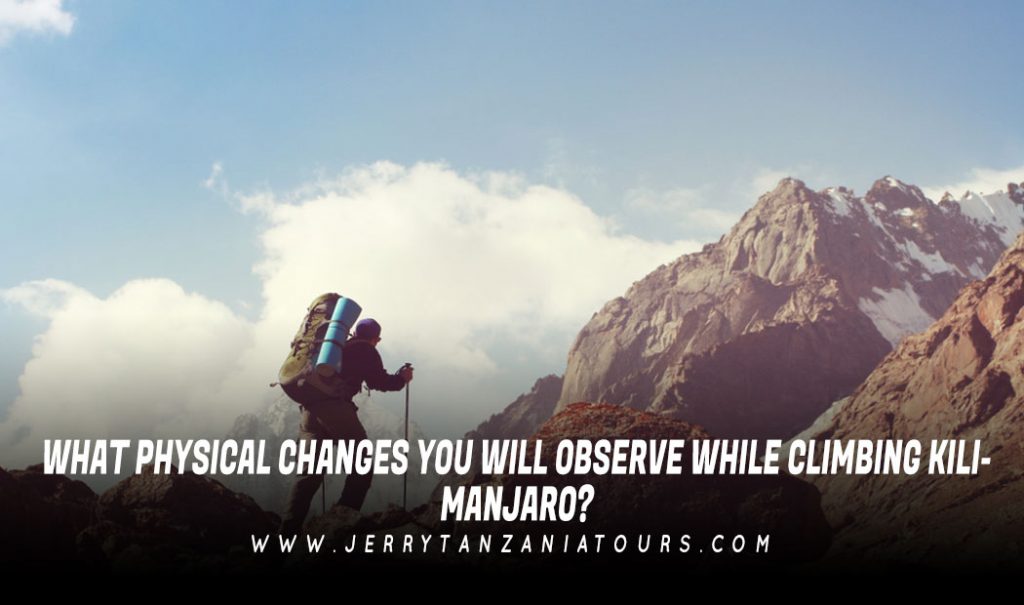
Since you are going to deal with dramatic weather variations, elevations, and high altitude climbing, Climbing Mount Kilimanjaro may mess with your body system or will have very little effect on it. So, it is very important to be prepared as soon as possible. In this blog, we will be discussing what you should expect your body to experience during your Kilimanjaro Hike. Most travelers think the biggest difficulty your body has to overcome is the physical climbing of the highest mountain in Africa but actually, it is the high altitude which creates the major difficulty.
Effect Of High Altitude On Your Body
- A high altitude occurs when you go to a region that is higher than 8,000 feet above sea level. And you will be trekking to the Kilimanjaro Summit that clocks in at an elevation of 19,341 feet. So there will be a very high effect of altitude up there.
- When you are at sea level, the air pressure here, causes oxygen molecules to accumulate together and drench the air with a plentiful amount you can breathe. Each inhales you take in, it delivers ample oxygen to your lungs.
- But at higher altitudes, however, due to the low air pressure, the oxygen molecules spread out. So you do not get a sufficient amount of oxygen inside your lungs.
- Since your body is habituated to working with more oxygen, it is going to naturally hard to compensate and get the same amount at higher altitude during your Kilimanjaro Trek.
- This will need more calories which may cause burning your body fats causing fatigue and weight loss.
Huddles That Your Body May Experience During Kilimanjaro Hike
High altitude has a different effect on a different body. Even the most physically fit person might not escape its effects
Let’s have a look at the bodily changes that are seen during Climbing Mount Kilimanjaro:
Breathing Issue
When you climb to a height of 12,000 feet, it will feel like you have almost 40% less oxygen to breathe.
You may feel short of breath because you will not get as much oxygen as you normally catch at sea level. It will cause an increased respiratory rate or the number of breaths you take in per minute. So you will be forced to push more oxygen into your lungs.
Many hikers choose to bring Diamox concerning Kilimanjaro Health and Medications, as it helps your body to breathe deeper and faster which will allow more oxygen into your lungs and bloodstream.
Since your lungs will perform all this extra work, your heart will also pitch in to help that oxygen to move around your body.
Increased Heart Rate
As your body slowly gets acclimatize to higher altitudes, your heart will beat faster to transport more oxygen throughout the whole body.
The faster your heart beats, the more blood pumps and the more oxygen gets supplied everywhere inside the body.
Research shows that your body will create 30-50% more red blood cells (RBC) as soon as you spend the first night in a high altitude environment during your Kilimanjaro Hike. Red blood cells act as an oxygen carrier in your blood.
Your body also boosts capillary production, which makes short the distance between multiple red blood cells so it will be easier for oxygen to flow around.
Insomnia
Your body will start flaking excess body weight through urinating. So you may find yourself waking up in the middle of the night to use the restroom.
Other times, your body may forget to breathe deeply while you slumber so your brain will wake your body up to make sure it performs this critical function.
Dehydration
At high altitude, dehydration is very common. When you climb to a height above 6,000 feet on Kilimanjaro, your body releases sweat twice as much as it does at sea level.
At the low air pressure evaporates a little moisture that your skin does have so you will notice a drier skin too. You should drink plenty of water to stay hydrated on the Mountain and a lightweight moisturizer that keeps your skin hydrated.
In addition to your CamelBak or Platypus, you can also bring some hydration salt tablets to add to your water to prevent the body from dehydration and ensure that your electrolytes must be balanced properly.
You may think all this tiring trekking schedule will bring a good night’s sleep but some hikers experience trouble sleeping being at the high altitude.
Body Fluid Shift
Your body will project all power and oxygen to the organ where it is needed the most while Climbing Mount Kilimanjaro, i.e., your brain, lungs, and heart.
But that means you may experience headaches as a result of this higher altitude or the rapid rush of blood to the head.
You may find swelling on your fingers and feet will. One more important thing, never Hike Kilimanjaro in new boots, which may cause blisters on your foot.
Your body will carry less blood to organs, those are not in heavy use during your Kilimanjaro climb, such as your digestive tract. It may cause loss of appetite, nausea, and possibly even vomiting.
Climbing Mount Kilimanjaro is going be the most memorable trip of your life, so prepare yourself the best to experience the adventure in between the serenity. Start your Training For Kilimanjaro at least before six months you leave for the Kilimanjaro hike. Keep a special eye on the Kilimanjaro Health and Medications as it will protect you from being captured by the Altitude Sickness. Get your bags ready and travel with us, Jerry Tanzania Tours to avail the best Kilimanjaro experience ever. We provide all the facilities abiding by all the safety measures.
Let us know your queries below in the comment section and our experts will answer them soon
